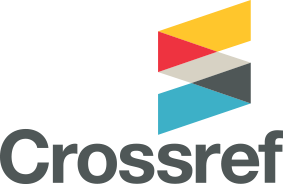Potensi Suplementasi Resveratrol dalam Mengatasi Efek Negatif Hormon Tiroid pada Terapi Obesitas: Uji Preklinik
Abstract
Terapi obesitas menggunakan hormon tiroid menurunkan berat badan dengan nyata, namun menyebabkan berbagai efek negatif seperti stres oksidatif, kerusakan DNA, dan muscle wasting. Penelitian ini bertujuan mengkesplorasi potensi resveratrol (RSV), polifenol alami yang mempunyai efek antioksidan, anti-inflamasi, dan antiobesitas. Uji preklinik dengan rancangan acak sederhana dilakukan di Lab Hewan Fakultas Kedokteran Universitas Padjadjaran menggunakan 40 ekor tikus Wistar yang diinduksi obesitas. Hewan model obesitas dialokasikan secara acak ke dalam dua kelompok selama periode Agustus–November 2014. Kelompok perlakuan mendapat hormon tiroid 3 (HT3) dan RSV, serta kelompok kontrol mendapat HT3 saja selama 14 hari. Hewan coba yang mendapat HT3 dan RSV memiliki bobot badan lebih besar (290,5 g vs 251 g, p=0,016), massa otot lebih berat (2,57 g vs 2,25 g, p=0,036), indeks adiposit lebih kecil (0,89% vs 1,02%, p=0,026), dan area under the curve (AUC) gukosa lebih kecil (1.849,2 mg.mnt/dL vs 2.591,7 mg.mnt/dL, p<0,001) dibanding yang mendapat HT3 saja. Tidak terdapat perbedaan kadar MDA plasma (0,49 nmol/mL vs 0,44 nmol/mL, p=0,430) dan kerusakan DNA (19,7 pixel vs 22,0 pixel, p=0,657) pada kedua kelompok yang mungkin berhubungan dengan dosis dan lama pemberian resveratrol. Suplementasi resveratrol berpotensi mengatasi efek negatif hormon tiroid pada hewan model obesitas. Perlu penelitian lanjutan untuk mengetahui dosis optimal resveratrol sebagai antioksidan pada pengobatan obesitas menggunakan hormon tiroid. [MKB. 2016;48(1):51–7]
Kata kunci: Hormon tiroid, obesitas, resveratrol, uji preklinik
Resveratrol Supplementation Potential in Managing Negative Effects of Thyroid Hormone during Obesity Treatment: a Pre-Clinical Trial
Abstract
Treatment of obesity using thyroid hormone could give significant result in decreasing body weight, but it also causes various negative effects such as oxidative stress, DNA damage, and muscle wasting. This sudy aimed to explore the potential of resveratrol, a natural polyphenol, that has anti-oxidant, anti-inflammatory, and anti-obesity effects, in managing negative effects of thyroid hormone used as anti-obesity. A preclinical trial was conducted at the animal laboratory, Faculty of Medicine, Universitas Padjadjaran. Forty male Wistar rats underwent obesity induction before randomly allocated into intervention and control groups in August–November 2014. The intervention group received a 14-days of triiodothyronine (T3) and resveratrol (RSV), while the control group received T3 only. Obese rats treated with T3 and RSV were heavier (body weight of 290.5 g vs 251.0 g, p<0.016), had a heavier muscle mass (2.57 g vs 2.25 g, p=0.036), smaller adipocyte index, (0.89% vs 1.02%, p=0.026) and smaller glucose area under the curve (AUC) (1,848.2 mg.mnt/dL vs 2,591.7 mg.mnt/dL, p<0.001) than those who were treated with T3 only. There was no significance difference in MDA plasma levels (0.49 nmol/mL vs 0.44 nmol/mL, p=0.0430) and DNA damage (19.7 pixel vs 22.0 pixel, p=0.657) between groups, probably due to insufficient dosage of resveratrol. Our results indicate that resveratrol supplementation could counter negative effects of thyroid hormone used as anti-obesity in obese-rats model treated with T3. More research is needed to determine the adequate dosage of resveratrol to elicit anti-oxidant effect that could minimize the negative effects of thyroid hormone as anti-obesity. [MKB. 2016;48(1):51–7]
Key words: Obesity, preclinical trial, resveratrol, thyroid hormone
DOI: 10.15395/mkb.v48n1.734
Keywords
Full Text:
PDFArticle Metrics
Abstract view : 1089 timesPDF - 713 times

MKB is licensed under a Creative Commons Attribution-NonCommercial 4.0 International License
View My Stats






